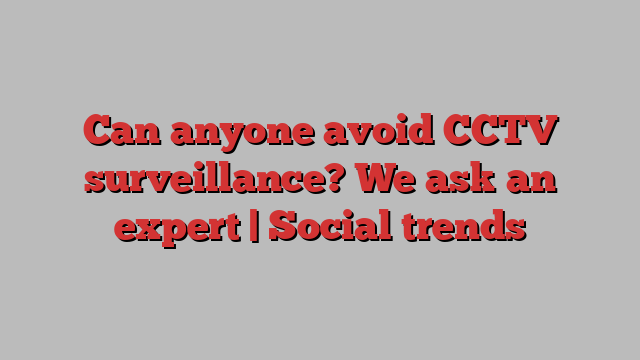
The hit BBC thriller The Capture has thrown the scale of camera surveillance into the spotlight. I ask Gus Hosein, director of Privacy International, just how advanced the technology is – and if it’s possible to avoid it.
You’ve got to watch The Capture, Gus. It’s about a police officer who finds people hacking into the CCTV network, and it hit home how omnipresent cameras are.
They are. It started with stadiums and transport, because of football hooliganism, and was later expanded by Tony Blair as a solution to crime. In the early 2000s, the private sector was convinced to join in – in order to get an insurance renewal, businesses needed cameras. Soon it was unquestioned, but there was an attempt by the coalition government to increase regulation on cameras. I don’t know if you’ve noticed, but there’s still crime!
Also, seeing CCTV footage online or when my bar manager mate sends me a screengrab – like “lol a guy brought his weasel in” – the faces are so blurry! But then I hear cameras are highly sophisticated. Which is it?
You’re nailing the problem: the tech sales people and the politicians are all on the same drug, which is “This tech is perfect”, because it’s cheaper than more police. There’s a lawsuit in the US because a black man was wrongly arrested based on facial recognition. Tech companies need to be held to account. One company we focused on, Clearview AI, scraped social networks – collected images of people’s faces and data from publicly available information – to create its software. Facial recognition relies on artificial intelligence. It needs to study faces. And only the government – the DVLA etc – and social networking companies have access to a lot of faces.
I did not post my Ibiza 2022 pictures for such nefarious ends. Is it true you can trick the cameras with makeup?
Not really. Facial recognition software can be tuned to deal with the fact that you have painted a scar on, say. It happened in China – when Covid broke out, people started wearing face masks, so they altered the software to deal with that. The latest bit of snake oil is tech that can detect mood, so cameras can see if you’re agitated and flag it. You can imagine the error rate.
Is it possible to avoid surveillance?
Online it is; but in the real world, if it’s deployed everywhere without any accountability, all we can do is force governments to regulate.
Is it the same for the private sector?
Increasingly our public space is becoming privately owned, and in private spaces rules don’t apply in the same way. The property company that owns land at King’s Cross in London deployed facial recognition technology a few years ago.
That’s where our offices are. I remember thinking: “I can’t believe I need a balaclava for a Pret run!” But then they said they’d stopped. Coming back to The Capture … is it possible to hack CCTV?
Only five or six nations – including the UK – have, within their government apparatus, extraordinary hackers: Russia, China, Israel, probably France and the US. If they want to do something bad to us, they can do it through hacking. And because we’ve been deploying this technology in a half-assed way – with so many vendors, differing standards and zero accountability – it could be easily hacked. I’m surprised it hasn’t happened yet.